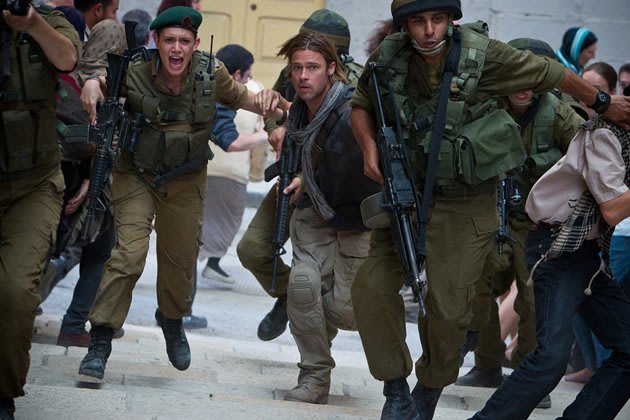
Did you hear that big sigh of relief from Brad Pitt and Paramount Pictures Sunday morning?
Despite all the well-publicized trouble – including five screenwriters, two endings, and millions over budget – Pitt and Paramount's "World War Z" cashed in at the box office this weekend, raking in $66 million domestically and $111 million worldwide – Pitt's largest opening ever.
And to add to Pitt's mirth, on the heels of the film's success, Paramount's vice chairman, Rob Moore,announced plans to develop a sequel. But odds are good it won't be the sequel that Pitt and company originally had in mind.
After Pitt and his Plan B production company won a bidding war with Leonardo DiCaprio'sproduction company, they optioned Max Brooks's novel, "World War Z: An Oral History of theZombie War." Plan B began developing the film as part of a trilogy, hoping to kick-start a franchise that Pitt would both star in and produce. They hired screenwriter J. Michael Straczynski to perform the difficult adaptation, but when he began quarrelling with director Marc Forster, Straczynski was replaced by Matthew Michael Carnahan.
Ultimately, neither screenwriter could deliver the ending that Paramount wanted.
SPOILERS BELOW
After principal photography finished, director Marc Forster showed a cut of "World War Z" to the studio; it featured an epic battle as the ending sequence. According to an expansive article in this month's Vanity Fair, the battle took place "in Russia, where the undead lay siege to Moscow's Red Square but are beaten back by an army of thousands, who, enslaved by the Russians, are forced to fight in ragtag battalions, lopping off the heads of the surging zombies with shovel-like weapons called lobos, short for 'lobotomizers.' The Russia battle not only was the pivotal action scene for the movie’s ending but also set up Gerry Lane [Pitt] as a leader in the war against the zombies for potential sequels."
Apparently, Brad Pitt running around Red Square chopping off zombie heads didn't appeal to Paramount's sense of global marketing.
Paramount quickly pushed the release date back from Christmas 2012 to summer 2013 and hired another screenwriter to rewrite the ending. Enter Damon Lindelof, the writer who got everyone confused with the TV series "Lost" (2004) and perplexed by "Prometheus" (2012).
To Lindelof's surprise, Paramount didn't feel at all bound to the footage that Forster had already shot. He was given carte blanche to create an entirely new ending. After inviting friend and fellow "Lost" writer Drew Goddard to help deliver the goods, they pitched ideas to executives from Plan B and Paramount.
In less than a month's time, Lindelof and Goddard delivered around 60 new pages that kept Gerry Lane's sympathetic-family-man appeal intact. Instead of lopping off zombie heads, Lane would outsmart the undead, using his wits to find a defense against the creatures. And he would ultimately return to the family he had been forced to abandon earlier in the film.
When it came time to reshoot the additional footage, Paramount hired yet another screenwriter – Oscar winner Christopher McQuarrie ("Usual Suspects," 1995) – to serve as the on-set script consultant. Though McQuarrie isn't credited, Lindeloff tweeted thanks to him for being an "unsung and uncredited writing hero of WWZ."
In case you're counting at home, that's five – count 'em, five – screenwriters.
At the end of the day, the creative team was probably correct in changing the ending, even though it took the story even further away from its original source material (at this point, they seem to berelated in name only). While the final sequence does feel tonally different from the rest of the film, from a story standpoint, the headier approach is more rewarding, not just intellectually, but also emotionally. One could argue that more summer blockbusters could tone down the spiraling violence that often ends a film (we're looking at you, "Man of Steel").
But with an entirely new ending, whatever story material Plan B had originally been developing for sequels will likely need to be scrapped. In other words, they'll likely need to find a plan B. Fortunately, they know a lot of screenwriters who can help them out. LINK


